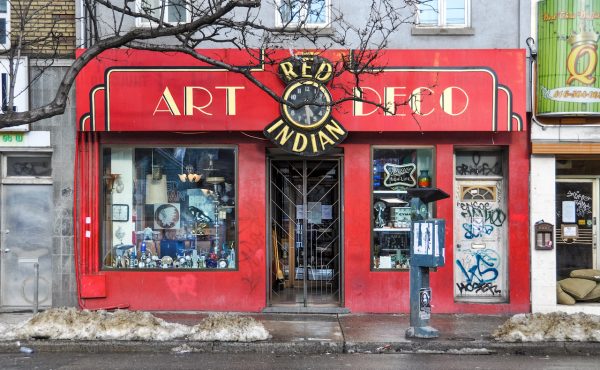
Editor’s note: At Afterword, the wake held for pages books on Tuesday night, a number of folks came up to say what the store meant to them. As Matt Blackett pointed out, the store was crucial to magazines like Spacing and other indie presses. Others talked about what a place like Pages meant to the city at large: functioning as a “cultural centre” as Johnny Dovercourt wrote two issues ago in Spacing. One of the speakers that night was Andrew James Paterson, an artist and writer that has been working in and around Queen Street since the late 1970s (poke around his website if interested, you’ll find some good stuff from this era up to the present day). The following is the text of his eulogy:
– – – – – – – – – – – – – – – – – – – – – – – – – – – – – – – – – – – – – – – – – – –
I think of Pages – that home away from home – and I think of so many things. I think of the bookstore’s size – not too big but not too small. That just about perfect size was, I think, crucial to why Pages was a great store and a great environment. It was large enough – there was enough room – for people to feel loose and relaxed – for people to have their private spaces. It was small enough for people to cross the floor.
In that sense, browsing shopping and yes buying in Pages was rather like surfing the net. It was rhizomatic. I could be in the Visual Art Section, and suddenly I would feel an urge to cross-reference something in the Film Section or the Music or Cultural Theory sections or other sections perhaps. I could do this quickly – none of the sections were at any great distance from each other while remaining distinct. One could say that Pages was a rhizomatic bookstore – it was a tree and it was the branches and it was all about connecting dots.
The size and also the design also contributed greatly to another aspect of Pages that was great and will be sorely missed. The Toronto art scene or community or whatever the clichéd word is in fact separate hardly homogeneous scenes or communities – the literary and the film and the visual arts do not really shake and greet all that much to, put it frankly. And there were and still are some very good specialty bookstores in Toronto – or bookstores with specific focuses perhaps at the expense of other areas of interest which are not necessarily for different people than the regular customers. Pages was a social bookstore. It was a meeting place – one where people could browse together or where old friends and acquaintances might bump into each other after years. It had the flexibility of libraries without being one of those places where everybody had to remain quiet.
Pages not only survived but flourished for years in what was a prime and primal location. Its proximity to OCAD and to CITY-TV – well, already we are entertaining contradictory universes. Pages in fact was in its location before CHUM-CITY moved west – they were there when A Space and Trinity Video and FUSE were all in that historic Ryerson building. Its proximity to Chapters around the corner – well, what’s the problem? Queen West was certainly big enough for two bookstores which were not necessarily apples and oranges but which were certainly different from each other. But leases are leases – is there such an animal as a permanent lease? Is there such a thing as a landmark that remains vitally in the present tense? Is there a place for a hands-on bookstore in the digital twenty-first century? Sure there is. A lot of readers including myself like to read on line, but sitting in the right chair or laying down against a pillow with the right book is one of the most rewarding if not the most rewarding ways to either spend or waste time. It is where production and pleasure need not be in opposition. Pages was like that too – a place or a meeting place for recreation and research. Toronto’s going to be a lot worse off without Marc Glassman and Company’s bookstore and social space. Toronto already is worse off without it.
Photo by sssteve.o.


6 comments
Enough already with the Pages eulogies. Ted Kennedy barely got this much sentiment thrown his way. This blog seems to have been obsessed with it these last few days.
It was a great bookstore, but please move on.
Oh boo Asher. Two posts? The other pages posts were event announcements, as we were helping throw it. There’s lots to explore when thinking about what stores/places like pages mean to cities.
I’m not convinced that Pages is or was rhizomatic. In fact, it’s a place based on the tree (and full of trees!). But I do agree with what you say about its size. There was something ‘not too big, not too small’ about it – and certainly less cramped than many. Also like the rampant grammatical and punctuation ‘errors.’
I’ve been on vacation and just discovered the fate of Pages by this post. Even though I don’t live in Toronto anymore, I am quite saddened by this news. That’s where I bought every copy of Spacing if I missed the launch party.
I think the formula could be stated simply: don’t stock crap. It was impossible not to find interesting books within minutes of walking in.
Chapters/Indigo take heed.
Asher: it was not only a great bookstore. It was the only one in the damn city! Much as I like Type, This Ain’t the Rosedale Library and Book City, I can’t think of any indie *new* book store that comes close. Can anyone?